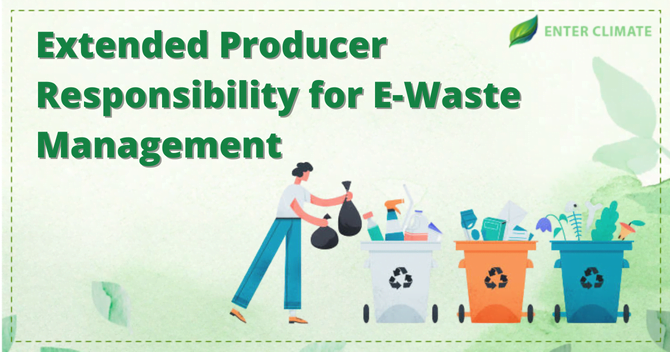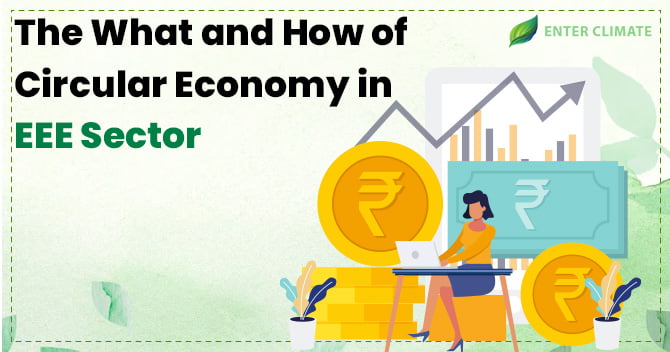Extended Producer Responsibility for E-Waste Management
 02 Sep, 2022
02 Sep, 2022 
When the lockdown was enforced worldwide due to Covid-19, forcing everyone to isolate themselves from the outside, the world adapted to the online mode of everyday work, including online offices and online school, resulting in skyrocketing sales of Electrical and Electronic Equipment (EEE) with a short life cycle and constant updates. This increase in sales and constant rise in demands among people have resulted in mountains of accumulated electronic waste (E-Waste). Notably, this e-waste, when exposed to water and soil, causes an increase in pollution and environmental degradation. This called for immediate action, which came in the form of Extended Producer Responsibility (EPR), which is explained in detail further. Therefore to address this issue of increasing E-Waste and producers’ disregard towards the environment, state authorities and governments have implemented policies, among which most extensively used is Extended Producer Responsibility. Extended Producers’ Responsibility is considered one of the most widely used environmental policies for effectively managing E-Waste by making producers liable for their products. The Policies of Extended Producer Responsibility in India are regulated under E-Waste Management Rules. The producers under this policy are required to register through the Central Pollution Control Board (CPCB) under the governance of the Ministry of Environment, Forest and Climate Change (MoEF).
Extended Producer Responsibility under E-Waste Management Rules
The E-Waste Management Rules, 2016, regulate the implementation and execution of Extended Producer Responsibility by providing the EPR targets to be completed by the producers of E-Waste either in numbers or weight. The target set is calculated as 30% of the estimated amount of waste generated in the first two years of the implementation of rules, following 40% in the 3rd and 4th year, 50% in the 5th year and 6th year as well as 70% during the 7th year. The rules further explain the procedure of collection, storage, transportation and management of E-Waste. Under E-Waste (Management) Rules, the producers, importers and brand owners have to apply for the registration of Extended Producer Responsibility. Under ERP, producers are made liable for setting up collection centres, filing an annual report and designing an EPR action plan to get it approved by Central Pollution Control Board. This Extended Producer Responsibility action plan involves detailed information on producers’ plan with dismantlers and recyclers through the third party that may include the producer’s responsibility organisation or by E-Waste exchange system or by themselves.
E-Waste under E-Waste (Management) Rule
Waste Electrical and Electronic Equipment come from various places, including households, government offices, commercial enterprises, manufacturers, and retailers. It includes various products such as washing machines, air conditioners, televisions, desktops, laptops, refrigerators, vacuum cleaners, and cell phones. India created 1,014,961 tonnes of e-waste in FY 2019-2020, increasing 32% from FY 2018-2019, according to a 2020 study by the Central Pollution Control Board. According to the research, only 3.6% and 10% of these were collected in the country in 2018 and 2019, respectively.
The Global E-waste Monitor 2017 shows that e-waste has grown to 44.7 million metric tons annually. But only 20% of the e-waste is documented to be collected and recycled. The fate of 76% (34.1 million metric tonnes) is unknown but likely dumped, traded or recycled under inferior conditions. Much e-waste also remains in its owners’ sheds, attics and storage rooms or gets disposed of with the average household bin.
In India, E-Waste is defined and regulated under E-Waste Management Rule. As per this rule, E-Waste is EEE which is either in whole or in part, thrown away as waste by individuals or bulk consumers and is rejected from industrial, refurbishment and restoration processes. Further, E-Waste can be categorised under various categories. But in India, under the E-Waste (Management) Rules, 2016, it is classified into two categories: IT & Telecommunication equipment and Consumer Electricals and Electronics, which include TV, fridges and so on.
Documents needed for Extended Producer Responsibility registration under E-Waste (Management) Rules
The documents prerequisite while applying for registration of Extended Producers Responsibility are as follows
Copy of the certificates from the competent authority for marketing various products or for doing the business as given below:
- TIN
- PAN
- Incorporation certificate
- Copy IEC for importers
- Copy of authorisation granted by the SPCBs/PCCs in case of those producers who are operating in the country before 01-10-2016.
- Documents related to the Extended Producer Responsibility plan as envisaged in sections.
- The estimated budget earmarked for EPR
- Self-declaration RoHS as per the format
- Details of proposed awareness programmes and allied initiatives
Copies of agreement documents with dealers, collection centres, dismantlers, recyclers, Treatment, Storage and Disposal Facilities (TSDFs), etc
The registration process for Extended Producer Responsibility
Extended Producer Responsibility Registration under E-Waste Management Rules is mandatory for all the Producers/Importers and Brand Owners mentioned under Schedule I of the rule. They are required to fill out Form I addressed to Central Pollution Control Board within 90 days. The procedure involves:-
- Firstly, the producers must fill out Form I with all the required information, including the producers’ names, information on the particulars of the electronic devices and so on.
- The data should also contain information on the projected generation of E-Waste and predictable target collection for the upcoming year, along with an overall policy to accomplish Extended Producer Responsibility.
- Once the information is filled in, the application form and the mandatory document are processed further.
Ultimately, if applications are submitted as per the rules, the Extended Producer Responsibility certificate will be provided by Central Pollution Control Board[1].
In case of renewal of Extended Producer Responsibility Authorisation, the producers must apply to the Central Pollution Control Board before one hundred and twenty days of ERP’sexpiry.
Challenges faced by Authorities
While the framed rules lay out all aspects relating to Extended Producer Responsibility and its implementation, in reality, the EPR Policy in India still has a long way to go. This can be attributed to a lack of coordination and cooperation among stakeholders. Along with this, India has also seen a constant rise in the informal sector which is not registered. The registration process serves an essential purpose of ensuring that state authorities can keep track of the EPR policies and assist producers/importers or brand owners.
Conclusion
Registration and acquiring EPR Certificate as per E-Waste (Management) Rules, 2016, is compulsory for all producers/importers/brand owners. This helps the Central Pollution Control Board to properly track the implementation of Extended Producer Responsibility and manage increased environmental pollution.
Read our Article: Responsibilities of Importers under E-Waste Management Rules, 2016













